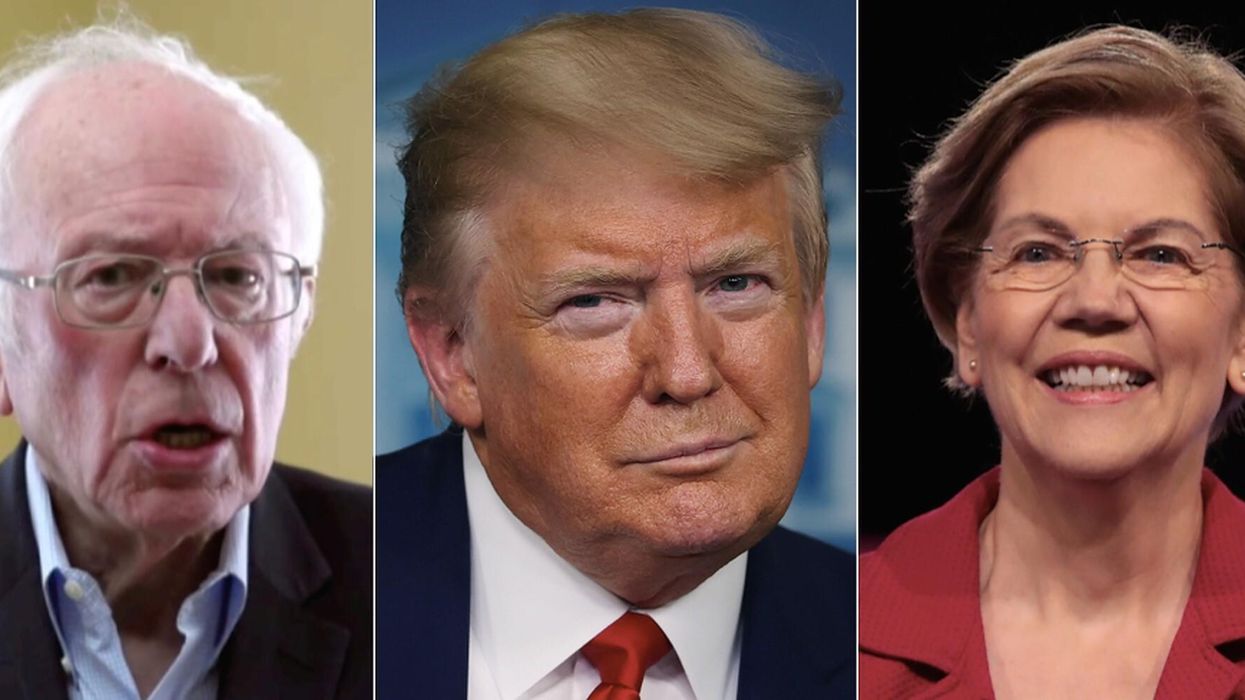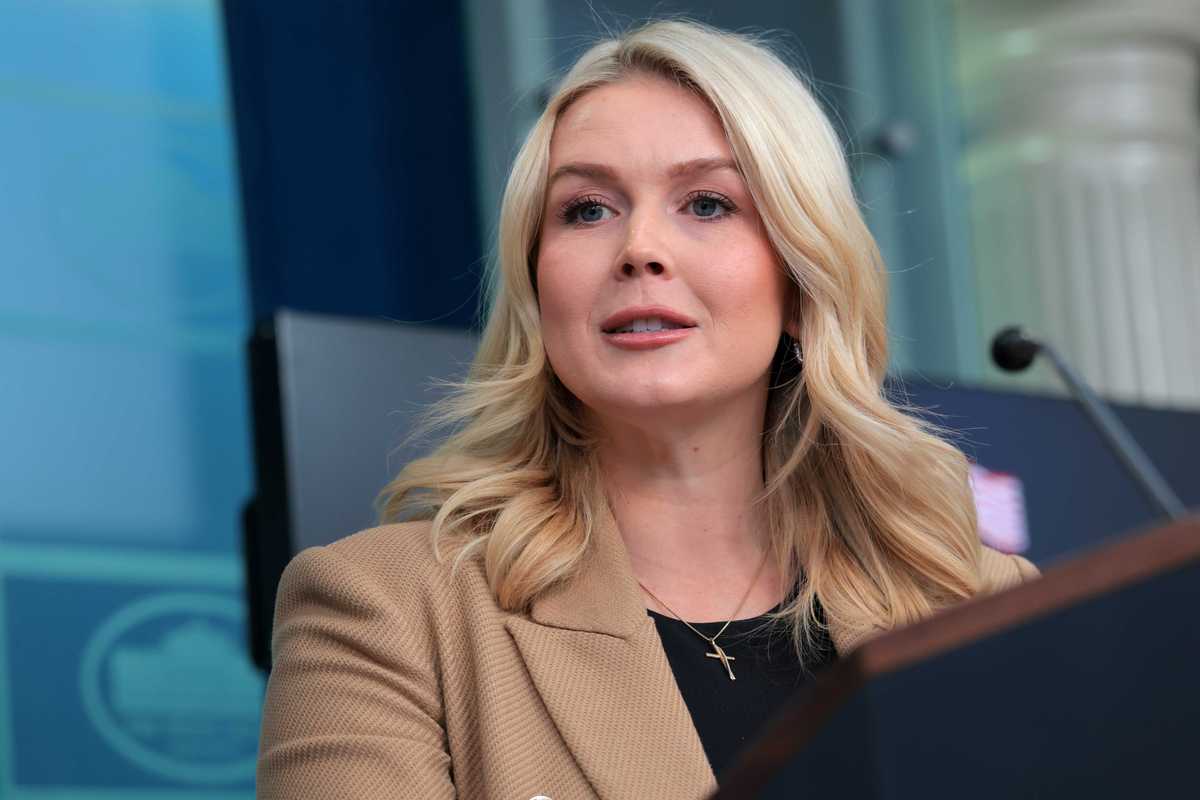News
Louis Staples
Apr 08, 2020
Just like that, Bernie Sanders' second presidential campaign is over.
Today the Vermont senator announced that he would be suspending his campaign for the Democratic Party nomination, clearing the path for former vice president Joe Biden to take on Trump in November 2020.
It only took minutes after the announcement for people, including the current president, to find a person to blame for Sanders dropping out: Elizabeth Warren.
Trump's tweet follows lots of discussion about Warren's role in Bernie's failure to become the Democratic nominee (for the second time).
Warren and Sanders are both widely considered to be from the "progressive" wing of the party (even if Sanders isn't technically a Democrat). It's long been asserted by some Sanders supporters that Warren "split" the vote and held Sanders back in the primary contest. After Warren dropped out, there was a lot of pressure on her to endorse Bernie immediately. And when she didn't there was some pretty ugly behaviour online, with a vocal minority of Sanders supporters spamming her with snake emojis.
But numerically speaking anyone blaming Warren for Sanders' defeat is simply... wrong.
Why? Let's cast our minds back to the results from Super Tuesday, when both Warren and Sanders were still contesting the nomination...
It feels like a really long time ago now, but the big story of Super Tuesday was Joe Biden’s big comeback. The former vice president spring-boarded from an impressive victory in South Carolina to win 10 out of 14 Super Tuesday states and more delegates than any other candidate. Biden’s sudden momentum and sweeping victories came off the back of endorsements by former Democratic candidates Pete Buttigieg and Amy Klobluchar, who dropped out of the race on the eve of Super Tuesday. Texan Beto O’Rourke, another former candidate, also endorsed Biden.
It was also a terrible night for Elizabeth Warren, whose campaign was fatally injured after she was humiliated by a third-place finish in her home state.
It seemed understandable, then, that Sanders supporters felt a bit annoyed at Warren’s continued presence in the race when she clearly had no chance of winning.
Lots of supporters of the Vermont senator blamed Warren for Sanders losing key Super Tuesday states where he was expected to do better. Congresswomen Ilhan Omar and Alexandria Ocasio-Cortez, who backed Sanders, publicly called for Warren to drop out, which she did days later.
But here's why it's wrong to blame her for Sanders' disappointing Super Tuesday.
Firstly, the idea that Warren was “splitting the vote” was based on the preconception that all of her supporters were Sanders supporters-in-waiting.
This was, of course, impossible. It might have the case that most Warren supporters backed Sanders once she dropped out, but certainly not all of them. There was even a movement called #WarrentoBiden of people who switched in the opposite direction.
By this logic, you could also assume that Warren was the second choice of most Sanders and Biden supporters. But we already know that wasn't true either, as most Biden supporters had Sanders as their second choice, and vice versa. In August I wrote about how the race would come down to the final three, and crunched some numbers on how second-choice preferences could decide the race. It was clear then that Warren would either triumph as everyone's compromise candidate, or crash and burn as Democrats were pulled to her left and right. Now we know latter theory prevailed.
On Super Tuesday, the numbers didn't support the idea that Sanders would have won any more states if it was a two-horse race.
If we remove Elizabeth Warren from the Super Tuesday numbers, then we'd also have to remove Michael Bloomberg (who dropped out the following day and by the same logic could be accused of "splitting" the centrist vote).
In Tennessee, for example, Biden won 42 per cent of the vote compared to 25 per cent for Sanders. If Warren’s tally of 10 per cent had gone entirely to Sanders he would still be short of Biden’s vote by 7 per cent. But, by the same logic, if we add Bloomberg’s 16 per cent share to Biden’s vote, he’d actually be further ahead of Sanders.
This same scenario repeats in Arkansas, Oklahoma and North Carolina.
Then there’s also the other centrist outliers who'd already dropped out, like Amy Klobluchar and Pete Buttigieg, who picked up a small amount of votes (either because people didn’t know they’d dropped out, had voted in advance or just wanted to vote for them anyway). Klobluchar picked up 7 per cent of the vote in her home state of Minnesota, which was won by Biden. She made it clear on the eve of Super Tuesday that she was backing Biden, so this would have further increased Biden’s lead over Sanders.
There was only one Super Tuesday state, while Warren was still in the race, where her vote shifting entirely to Sanders would have definitely changed the outcome if Bloomberg dropped out beforehand too: her home state of Massachusetts.
In Massachusetts, the Biden+Bloomberg vote would have been 2 per cent less than the Sanders+Warren vote. But this is a bit of an anomaly given it is Warren’s home state, and this win would have resulted in such a tiny shift of delegates that it's hardly a game-changer.
Now we know that Sanders didn't do any better when the race came down to two candidates.
In fact, Sanders arguably struggled more after Super Tuesday, when the field was narrowed, than he did in 2016. Michigan, for example, was comfortably won by Sanders against Clinton in 2016 but lost by double digits to Biden. This noticeable slide also happened in a time of global crisis when Sanders' flagship policy, access to healthcare, was at the top of the news agenda and will have been on the minds of most Americans. Given that Warren's healthcare plan was identical to Sanders', and she was no longer in the primary race when the pandemic started to spread across America, his struggle to gain any support from this point is unlikely to have had much to do with her.
Speculating on these outcomes is essentially meaningless anyway, because of the way Democrats distribute delegates.
Unlike their Republican opponents, Democrats don’t operate a winner-takes-all primary system. The way in which delegates are handed out in the Democratic primary is based on who passes the 15 per cent vote threshold and by how much, meaning that small shifts can make a big difference. This makes predicting delegates from splits in the vote percentage very challenging.
This explainer summarises the ridiculously tedious system nicely.
But percentage wise, Biden would have actually been further ahead of Sanders in the states he won on Super Tuesday if all other candidates were removed. He'd also have eaten into Bernie's crucial lead in California. Plus we now know he had no trouble wrapping up the contest once Warren had dropped out.
(And, at the risk of sounding petty, it's also worth noting that we didn't hear Bernie fans complaining when a heavily splintered centrist vote handed him easy wins in New Hampshire and Nevada, making him an early front-runner).
So it's really not Warren's fault that Sanders didn’t win big on Super Tuesday and eventually lost the Democratic nomination (for the second time).
It might make Trump or anyone else feel good to blame Warren, but that doesn't make it true. From where we're sitting, it looks a lot like fake news.
Top 100
The Conversation (0)














